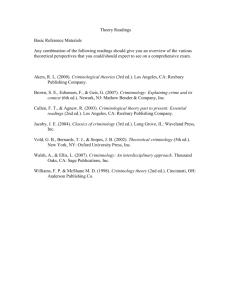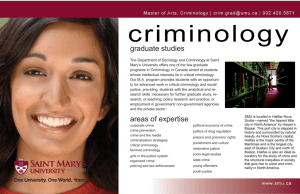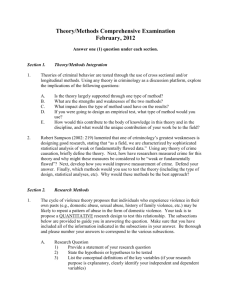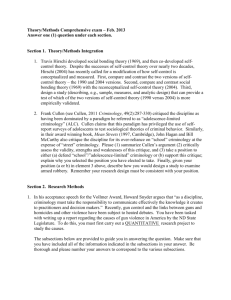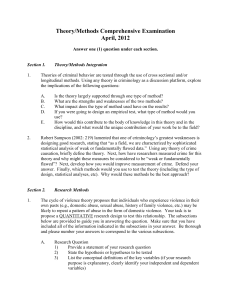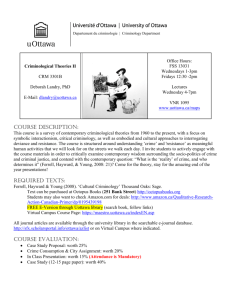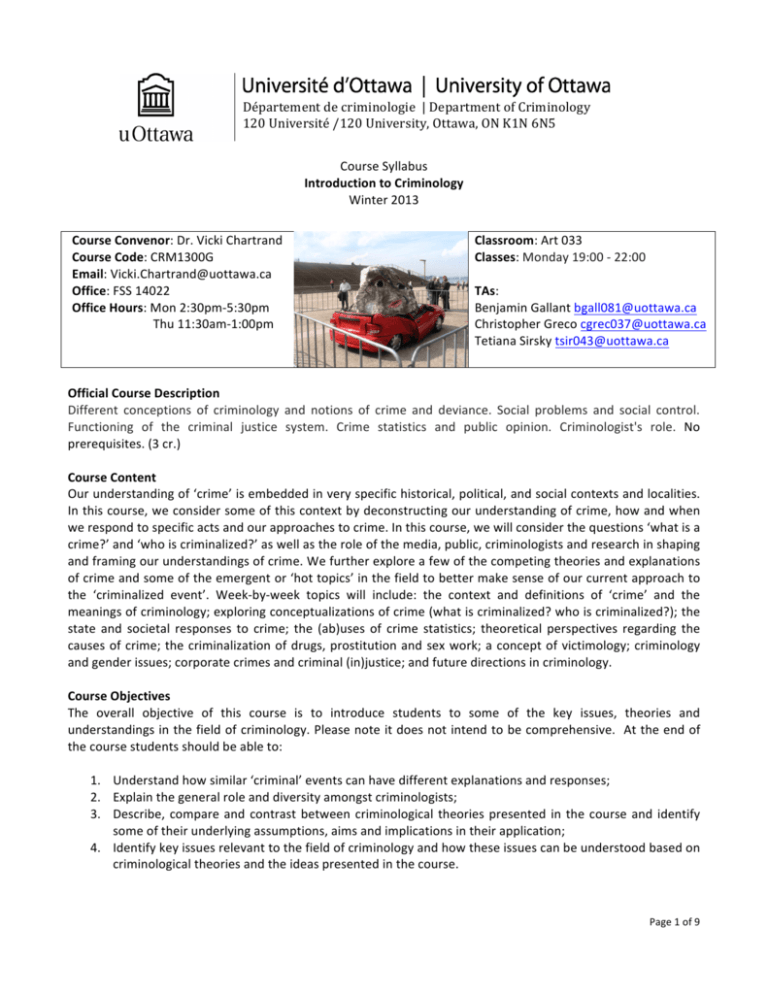
Département de criminologie | Department of Criminology 120 Université /120 University, Ottawa, ON K1N 6N5 Course Syllabus Introduction to Criminology Winter 2013 Course Convenor: Dr. Vicki Chartrand Course Code: CRM1300G Email: Vicki.Chartrand@uottawa.ca Office: FSS 14022 Office Hours: Mon 2:30pm-­‐5:30pm Thu 11:30am-­‐1:00pm Classroom: Art 033 Classes: Monday 19:00 -­‐ 22:00 TAs: Benjamin Gallant bgall081@uottawa.ca Christopher Greco cgrec037@uottawa.ca Tetiana Sirsky tsir043@uottawa.ca Official Course Description Different conceptions of criminology and notions of crime and deviance. Social problems and social control. Functioning of the criminal justice system. Crime statistics and public opinion. Criminologist's role. No prerequisites. (3 cr.) Course Content Our understanding of ‘crime’ is embedded in very specific historical, political, and social contexts and localities. In this course, we consider some of this context by deconstructing our understanding of crime, how and when we respond to specific acts and our approaches to crime. In this course, we will consider the questions ‘what is a crime?’ and ‘who is criminalized?’ as well as the role of the media, public, criminologists and research in shaping and framing our understandings of crime. We further explore a few of the competing theories and explanations of crime and some of the emergent or ‘hot topics’ in the field to better make sense of our current approach to the ‘criminalized event’. Week-­‐by-­‐week topics will include: the context and definitions of ‘crime’ and the meanings of criminology; exploring conceptualizations of crime (what is criminalized? who is criminalized?); the state and societal responses to crime; the (ab)uses of crime statistics; theoretical perspectives regarding the causes of crime; the criminalization of drugs, prostitution and sex work; a concept of victimology; criminology and gender issues; corporate crimes and criminal (in)justice; and future directions in criminology. Course Objectives The overall objective of this course is to introduce students to some of the key issues, theories and understandings in the field of criminology. Please note it does not intend to be comprehensive. At the end of the course students should be able to: 1. Understand how similar ‘criminal’ events can have different explanations and responses; 2. Explain the general role and diversity amongst criminologists; 3. Describe, compare and contrast between criminological theories presented in the course and identify some of their underlying assumptions, aims and implications in their application; 4. Identify key issues relevant to the field of criminology and how these issues can be understood based on criminological theories and the ideas presented in the course. Page 1 of 9 Students will be tested on their capacity for retaining and comprehending the material introduced throughout the course, their ability to apply understandings and theoretical knowledge to practical cases and problems and their ability to identify the relationship between concepts and issues. Students will acquire a more critical and independent thought, build their theoretical and interdisciplinary skills and develop more succinct and well-­‐
articulated ideas and arguments. Format and Activities The course activities and evaluations consist of lectures, reading materials, videos, group work and discussion. On-­‐line learning is also part of the learning environment of this class where you can access materials such course outlines and other informational materials. Power point presentations will be posted prior to class for you to download. Please note that grades will not be posted on Virtual Campus or emailed as students are expected to attend class, where exams and assignments are returned. Official final grades are posted on InfoWeb. It is important that you complete all required readings before class. During lectures you may be asked to answer questions about and/or discuss various issues and cases from the readings. Each class meeting will consist of a lecture followed by a discussion period in which there will be discussion groups and a question and answer period. This discussion will serve as an opportunity to illustrate thematic links between the substantive topics covered each week. Coming to class prepared will therefore help to ensure that these exercises are worthwhile learning experiences. Attendance and Course Support As per University of Ottawa policy and given the complex nature of the course material and readings, class attendance is necessary to satisfactorily complete this course. You are responsible for all the material outlined for the course, inclusive of the lectures, group work, discussions, assigned readings, and any other material (handouts or films/documentaries) that may be used. Should you miss a class, you are not required to inform the course convenor unless it conflicts with examinations. Please collect the course notes from a classmate. If you have questions outside of class and office hours, email is the preferred form of communication. For all questions sent by e-­‐mail, please allow up to two working days (48hrs) for a response. If a question requires a longer response, please visit the Course Convenor during her office hours or set up an appointment with her or the Teaching Assistant (T.A.) Please do not send the same questions via email to more than one us at a time. If you have any special learning needs or considerations, feel free to speak to me confidentially or visit Access Services (see below for further information). Course Readings Hackler, James C. (2007) Canadian Criminology: Strategies and Perspectives, 4th Edition. Toronto, Canada: Pearson/Prentice Hall. Wiebe, Rudy and Yvonne Johnson (1998) Stolen Life: The Journey of a Cree Woman, Toronto: Alfred A. Knopf Canada. Available at Benjamin Books, 122 Osgoode St, 613-­‐232-­‐7495. Additional readings and case studies may be assigned throughout the course to supplement the course text and lectures. These will be made available either on line or on reserve in the library. Page 2 of 9 Examinations To receive a grade in this course you must complete all of the course requirements. You cannot replace any exam or assignment with alternative or additional work. Please allow two weeks for the return of your assignment. Written Assignment – Due Monday, March 25 (30%) This is a take-­‐home assignment that consists of reading the book Stolen Life: The Journey of a Cree Woman (1998) by Rudy Wiebe and Yvonne Johnson and responding to the below series of interrelated questions: 1. What is the main idea of the book? Be sure to summarize and link the main points (1/2 page). 2. What were some of the social, political and personal factors that led to Yvonne Johnson’s arrest and imprisonment (i.e. gender, poverty, race, drug use, etc.)? How are we to make sense of these factors with respect to what we have learned in class (1 page)? 3. Explain what you have learned from this book. Be sure to link and support your ideas with course material (1/2 page). Marking Scheme Comprehension and summary of the book (5%) Identifying, explaining and linking ideas and concepts in the book with course material (10%) Developing a conclusion as linked and supported to course material (5%) Overall structure and supporting evidence (5%) General writing quality and referencing (5%) Papers should be approximately 500 words (2 pages double-­‐spaced). A penalty will be incurred for exceeding the maximum word length. Be sure to reference your sources and include a ‘References’ page that indicates the texts and class lectures and materials you used. You are not required to consult outside sources. Papers must be in essay style format, typed, double spaced, using standard font, with margins 1” from top and bottom and 1¼” from left and right. You do not need a title page, but be sure to include your name and student number. Proofread your work carefully for typographical errors, grammar, spelling, and clarity of expression as assignments are partially evaluated on the quality of writing. Writing Hints 1. Start with an outline, develop a thesis statement (point you are trying to make) and then start writing. 2. The first paragraph is the most important and should serve as a roadmap of your paper. 3. Your thesis will also be the conclusion that your entire essay will try to establish and support. 4. Use concepts, ideas and examples from course materials and the book to support or highlight your points. 5. Use headings and sub-­‐headings to break down your work into sections -­‐ do not simply repeat the question. Midterm Exam – Monday, February 25 (30%) This is a 2-­‐hour in-­‐class written exam consisting of multiple-­‐choice and short & long answer questions. It will include lectures, videos, group work, discussions and readings and will cover the following course topics: 1. An Introduction to the Discipline of Criminology: What is a Crime? 2. Conceptualizing Crime and Control: Who is Criminalized? What is Criminalized? 3. Studying Crimes and Criminals: What Criminologists Do 4. The Nature and Distribution of Crime: Lies, Dammed Lies and Statistics 5. Consensus Theories: Structural Tradition Page 3 of 9 Final Exam – Exam Week (40%) The final exam is a 2-­‐hour written exam that is cumulative and covers all course material including lectures, videos, group work, discussions and readings. The format includes multiple-­‐choice and short and long answer questions. Failure to write the final exam will result in an EIN (incomplete) on your transcript. Written Exam Regulations Witten examinations or tests, students are prohibited from using books, texts, notes, etc., any electronic devices or any other communication tool that has not been approved beforehand (e.g. French-­‐English dictionary, calculator). Any such device or tool must be shut off, stored and out of reach. Anyone who fails to comply with these regulations may be charged with academic fraud. Students who arrive later than 25 minutes after the distribution of examination questionnaires cannot be admitted into the exam room. In addition, no student can leave the room before one hour of the allotted exam time has passed. Unless otherwise specified, students must use both sides of each page in their examination booklets. Grading Exams are generally graded on insight, accuracy, detail, linking of ideas, use of supporting evidence and examples and evidence, and general writing quality. Each letter grade is based on the following percentage scores: A+ = 90 -­‐ 100% B+ = 75 -­‐ 79% C+ = 65 -­‐ 69% D+ = 55 -­‐ 59% E = 40 -­‐ 49% A = 85 -­‐ 89% B = 70 -­‐ 74% C = 60 -­‐ 64% D = 50 -­‐ 54% F = 0 -­‐ 39% A-­‐ = 80 -­‐ 84% Grade Range The below is a general description of the quality of work that is expected from students in order to achieve a specific grade range. A+ Structures a well developed, argued and supported essay. Coherently integrates A diverse class materials. Elucidates, links and integrates concepts and ideas. Highlights A-­‐ and applies the main tenants of the theories. Offers independent and critical analytical insight. Succinctly written and properly referenced. B+ Has a clear and coherent argument. Can easily highlight the main tenants of concepts B and theories, while offering some independent and critical analytical insight. Incorporates class discussion and materials. Well written and properly referenced. C+ Able to develop an argument and highlight the basic theoretical assumptions. Makes C use of class discussion and materials. Proofread and referenced. D+ Points out basic assumptions of theories. Offers opinion and backs it up with D examples from class discussion and materials. E Fails to address the basic concepts. F Page 4 of 9 Appealing Grades If you disagree with your grade or marking, you may request an exam review by providing a written argument and evidence of where a higher grade or mark is deserved. This must be done within one week of receiving your exam. A grade or mark reassessment has three possible outcomes: 1) no change in grade: the initial grade is deemed fair; 2) increase in grade: relevant aspects of work may have been overlooked or misinterpreted; 3) decrease in grade: quality of work is deemed to have been overestimated. Extensions/Make-­‐Ups & Late Assignments Extensions or make-­‐ups will not be granted other than for medical reasons, accompanied with official medical certification. Please be sure the medical certificate includes the following: 1) student name; 2) date(s) of absence as well as the date studies may resume; 3) course(s) code(s); 4) the date and signature of the attending physician. Absence for any other serious reason must be justified in writing, to the academic assistants of the Faculty, within five business days following the date of the exam or submission of an assignment. The Faculty reserves the right to accept or refuse the reason. For final exams/assignments, students must inform the instructor directly no later than five working days after the examination date or the assignment deadline and present a medical certificate bearing the seal of the Faculty and the form entitled «Request for deferred grade». Should the medical certificate not bear the seal of the Faculty, the instructor will refer the student to the undergraduate secretariat of the Faculty. Reasons such as lack of preparation, travel, employment, and misreading of course syllabi or examination schedule are not accepted as reasons for extensions or absenteeism. Students must seek extensions or make-­‐
ups prior to the submission date, unless prevented from doing so by exceptional circumstances. Where applicable, for unauthorized late assignments, each day late leads to a deduction of one (1) mark per day, including weekends. Collegiality All students are expected to conduct themselves in a collegial and respectful manner. To provide a focussed classroom environment and to promote learning without distraction, the use of mobile technology including mobile phones, pagers, Mp3 players and other such electronic devices must be turned turn off prior to the start of class. You are welcome to use computers to make notes or a recording device to record lectures unless you are asked to turn them off for particular presentations or at the request of other students. Ask the instructor prior to using these devices. The University provides a unique environment for students to interact with course and other educational materials via the Internet. Social media sites (e.g. Facebook, Twitter, Messenger, Email, etc.) detract from the learning environment by distracting the instructor and other students and interfering with your ability to focus on course content. Students who insist on using such Internet forums during class may be requested to sit in the back of class to minimize the negative impact on teaching and learning. Students will be asked to turn off and/or shut their laptops/notebooks/tablets during a guest lecture presentation; you are still responsible for taking notes, so be sure to bring pen and paper. Page 5 of 9 Student Resources Mentoring Centre -­‐ http://www.sciencessociales.uottawa.ca/mentor/fra/ The goal of the Mentoring Centre is to help students with their academic and social well-­‐being during their time at the University of Ottawa. The Mentoring Centre offers a place for students to talk about concerns and problems that they might have in any facet of their lives. Career Services -­‐ http://www.sass.uottawa.ca/careers/ Career Services offers various services and a career development program to enable you to recognize and enhance the employability skills you need in today's world of work. Counseling Service -­‐ http://www.sass.uottawa.ca/personal/ Counseling service offers personal counseling, career counseling and study skills counseling. Access Service -­‐ http://www.sass.uottawa.ca/acces/ The Access Service contributes to the creation of an inclusive environment by developing strategies and implementing measures that aim to reduce the barriers to learning for students who have learning disabilities, health, psychiatric or physical conditions. Student Resources Centers -­‐ http://www.communitylife.uottawa.ca/en/resources.php The Student Resources Centers aim to fulfill all sorts of students’ needs. Other Useful Resources • The Aboriginal Resource Centre • Financial Aid & Awards • Resource Center for Women • Graduate Students Association • International House • Health Services • InfoWeb • Center for Adult Students • Pride Center • Sexual Harassment office • Spiritual Resource Center Writing & Style Guides The Faculty of Social Sciences offers an online Writing and Style Guide intended to facilitate students in the writing of university papers and assignments. The guidelines and usages in the Guide represent the standard assignment-­‐writing guidelines for all courses at the Faculty of Social Sciences. A copy of the Guide is available in your units’ secretariat and on this website: http://www.socialsciences.uottawa.ca/guide-­‐en.asp The Student Academic Success Service (SASS) also created other work tools to help students write papers and assignments. Writing Resource Centre: http://www.sass.uottawa.ca/writing/ Students can also refer to the USB key given to all first year students for information on methodological guides. It is available online at the following website: Page 6 of 9 http://www.sciencessociales.uottawa.ca/USB/cleusbkey.swf Some Helpful Hints on Writing and Referencing 1. Use the active voice wherever possible rather than the passive, e.g. “The professor stated…” not “It was stated by the professor…”. 2. Avoid unnecessary phrases, e.g. “It is important to note that…”, “As previously stated…”. 3. To persuade your audience, when your source is something someone has written or said, say “he or she said, stated, asserted, contended, claimed, argued” rather than “he or she felt, thought, believed”. 4. Words ending with “um” are in the singular (datum, medium, memorandum) and are in the plural when ending in “a” (data, media, memoranda). These plural words require plural verbs (e.g. “are” not “is”) and adjectives (e.g. “these” not “this”). The plural of the word phenomenon is phenomena. 5. The word “it’s” is short form for “it is”; the word “its” is the adjectival form of the word “it” The word “who’s” is short form for “who is”; “whose” is the adjectival form of the pronoun “who”. Note: A good aid to writing is the classic, Elements of Style, by William Strunk, Jr. and E.B. White. Also see, Writing for Social Scientists: How to Start and Finish Your Thesis, Book or Article, by Howard Becker. Plagiarism & Academic Misconduct Be Aware of Academic Fraud! Academic fraud and plagiarism is the use of another person’s words or ideas without specific acknowledgment and is not tolerated by the University. This includes to plagiarize or cheat in any way, present falsified research data, submission of an assignment that, in part or in entirety, you are not the author of, presentation of, without written permission of the professor(s) concerned, the same work from another course. The rules against plagiarism apply equally to the work of published authors, Internet sources and of other students. Plagiarism is an academic offence. It also subverts learning as it undermines the generic research and skills that are developed through the process of doing one’s own work. For more information on fraud and how to avoid it, you can refer to the Faculty web page, which offers tips to help you with your studies and the writing process for university level projects at the following address: http://www.socialsciences.uottawa.ca/eng/ugrad_tips.asp. You can also refer to the Faculty web page for information on plagiarism and university assignments: http://www.socialsciences.uottawa.ca/eng/ethics.asp. Any type of cheating or plagiarism will result in a grade of zero on the assignment. This could carry even more severe penalties such as additional requirements added to the program of study (3 to 30 credits), suspension or expulsion from the Faculty. Students are responsible that they understand and are familiar with the University of Ottawa’s policies and regulations on plagiarism and academic dishonesty. Important information on this matter can also be found at the following links: http://www.uottawa.ca/academic/info/newsletter/fraud_e.html http://www.uottawa.ca/plagiarism.pdf http://web5.uottawa.ca/mcs-­‐smc/academicintegrity/regulation.php If you are still unsure about what amounts to academic misconduct, please speak to the course convenor. Page 7 of 9 Département de criminologie | Department of Criminology 120 Université /120 University, Ottawa, ON K1N 6N5 Course Syllabus Introduction to Criminology Winter 2013 Course Schedule (Note: schedule is subject to change) 1. January 7 An Introduction to the Discipline of Criminology: What is a Crime? No Readings 2. January 14 Conceptualizing Crime and Control: Who is Criminalized? What is Criminalized? Readings Hackler. Canadian Criminology. Chapter 1. “What is Crime? What is Deviance?” 3. January 21 Studying Crimes and Criminals: What Criminologists Do Readings Hackler. Canadian Criminology. Chapter 2. “Explaining Crime: Contrasting Approaches.” 4. January 28 The Nature and Distribution of Crime: Lies, Dammed Lies and Statistics Readings Hackler. Canadian Criminology. Chapter 3. “The Meaning of Crime Statistics.” 5. February 4 Consensus Theories: Structural Tradition Readings Hackler. Canadian Criminology. Chapter 8. “Focusing on the Structure of the Society: The Consensus Tradition.” 6. February 11 Conflict Theories: Critical Tradition Readings Hackler. Canadian Criminology. Chapter 9. “Conflict Theories: Society Responses to Crime.” 7. February 18 Reading Week -­‐ No Class No Readings 8. February 25 *Midterm Exam 9. March 4 Criminalization of Drugs & Public Sex Readings Hackler. Canadian Criminology. Chapter 11. “Drug crime: The Consequences of Hypocrisy.” & Chapter 14. “The Criminalization of Sex.” Page 8 of 9 10. March 11 A Concept of Victim and Gender Issues in Criminology Readings Hackler. Canadian Criminology. Chapter 12. “Victimology.” & Chapter 13. “Women’s Issues and their Relation to Crime.” 11. March 18 Crimes and Power Dynamics: Community and Corporate Crime Readings Hackler. Canadian Criminology. Chapter 17. “Community and Justice System Responses to Crime” & Chapter 18. “Corporate Crime and White Collar Crime.” 12. March 25 The Future of Crime and Criminology Readings Hackler. Canadian Criminology. Chapter 20. “Criminogenic Conditions: Implications for Crime Control.” *Written Assignment Due April 1 Easter Monday – No Class No Readings 13. April 8 Course and Exam Review No Readings April 11 – 24 Exam Week *Final Exam Page 9 of 9


